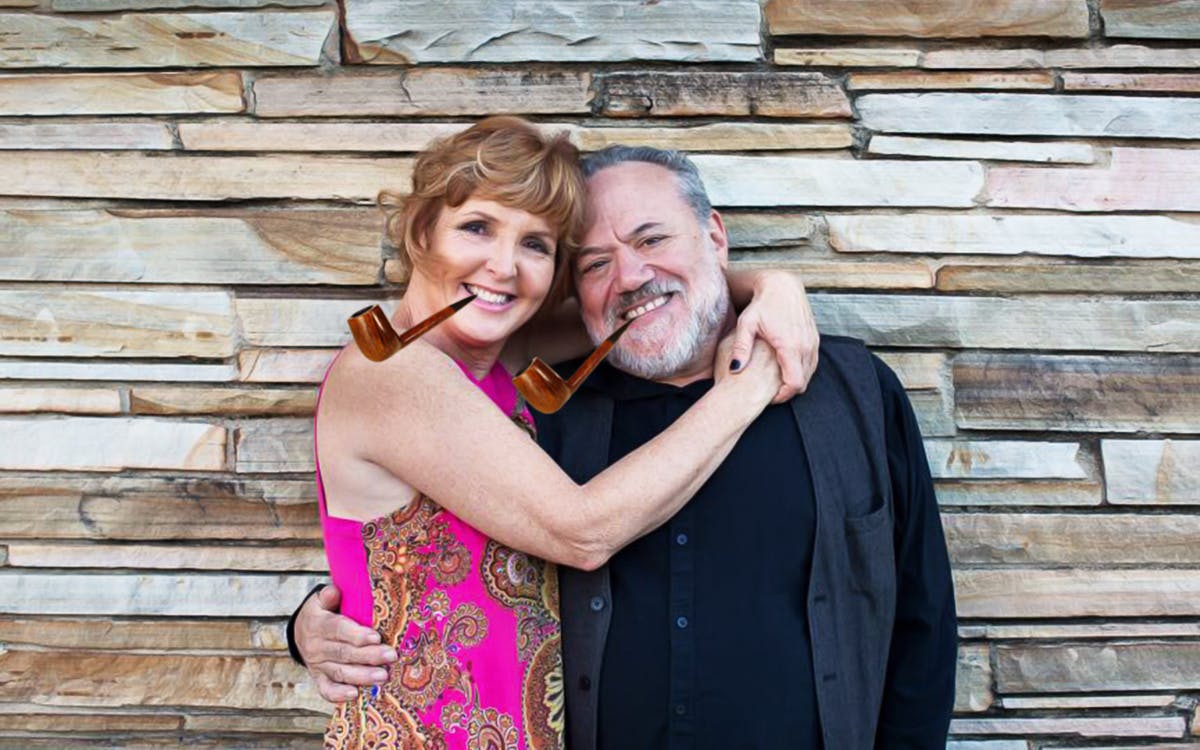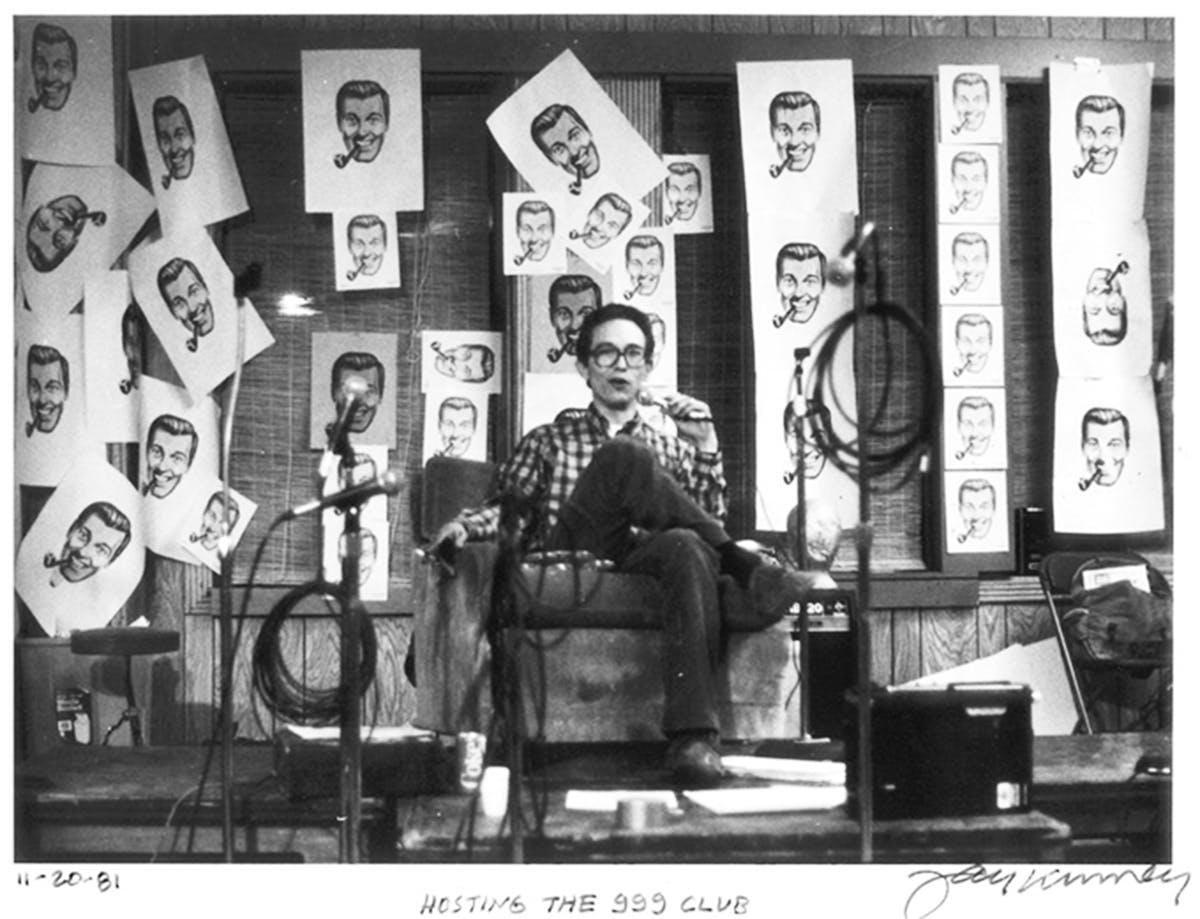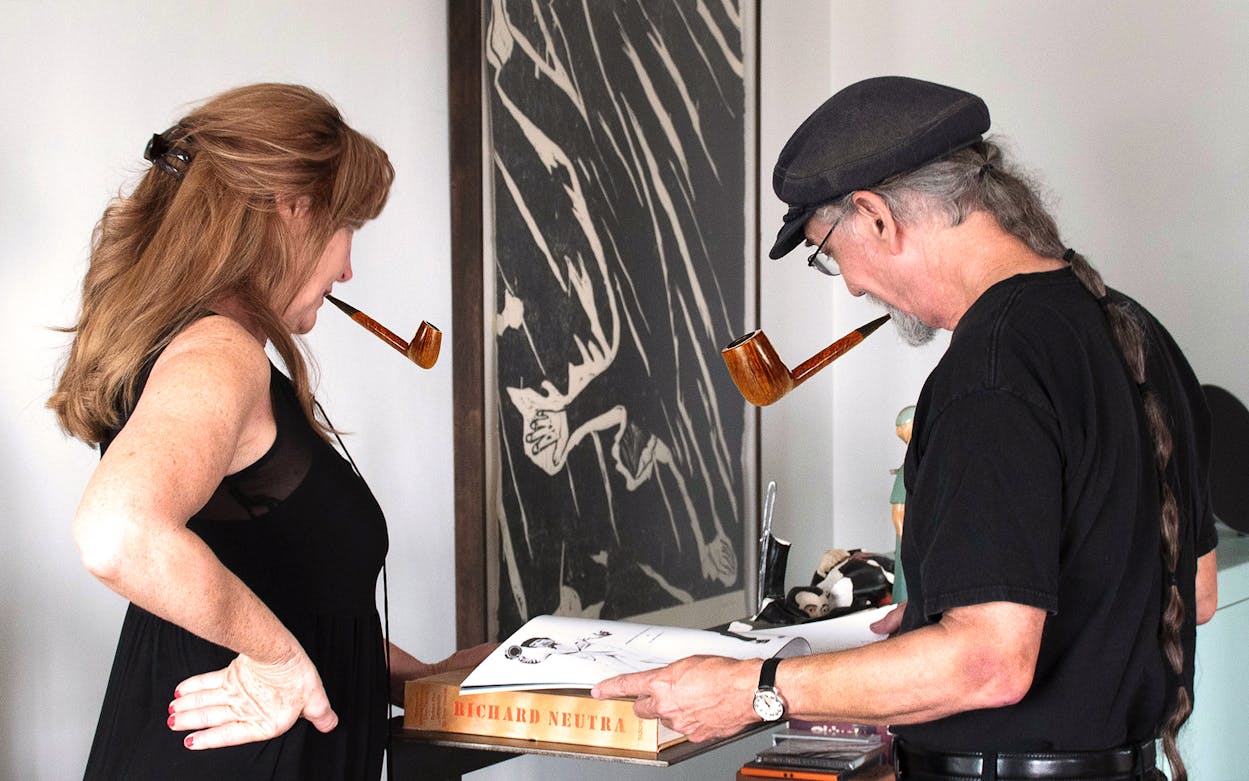In 1980, two smart, goofy nerds in Dallas decided to start their own religion. Their names were Doug and Steve, but in the grand tradition of charlatans everywhere, they invented new names for themselves as apostles of the deity of their made-up belief system: Reverend Ivan Stang (born Douglass St. Clair Smith) and Dr. Philo Drummond (Steve Wilcox), ready to educate the masses through the Church of the SubGenius about the great J.R. “Bob” Dobbs and to spread his gospel of “Slack.”
Somehow, against all odds, the Church of the SubGenius became a real thing, if not exactly a real religion. It spread well beyond Dallas, capturing the imaginations of a number of important counterculture figures of the era. Devo frontman Mark Mothersbaugh, actor Paul Reubens (known for his role as Pee-wee Herman), Talking Heads frontman David Byrne, cartoonist R. Crumb, gonzo bluesman Mojo Nixon, and more all claimed a SubGenius affiliation. All of them sought Slack, an unspecified philosophical state that the church maintained as its answer to enlightenment.
To be clear, all of this was something between a con job and an inside joke. But the people involved took perpetuating that joke seriously. The Church of the SubGenius published five books. One of them, The Book of the SubGenius, has remained in print for decades. People who wanted to play along with the gag launched radio shows in the 1980s (including The Puzzling Evidence Show in Berkeley, California, which has run for more than thirty years) and their own websites in the ’90s. But as a group that was defined by its arch sense of humor and its nesting-doll-style approach to playing with layers of facts, the true story of the people who defined the SubGenius was never told.
Until now, anyway. Filmmaker Sandy K. Boone—whose late husband, David Boone, was one of the first people to sign up for the SubGenius’s mailing list—announced in October a Kickstarter campaign to fund Slacking Toward Bethelhem, a documentary that would tell the true and unabridged story of the Church of the SubGenius for the first time. Boone, who collaborated with Austin Chronicle and SXSW founder Louis Black on the documentaries Jonathan Demme Presents: Made In Texas, Richard Linklater: Dream is Destiny, and Tower in recent years, along with St. Clair Smith, spoke with Texas Monthly without any of the in-character gags (well, almost) to discuss what the SubGenius means in the age of Trump, why the SubGenius mustn’t turn into Scientology, and what it feels like to stop keeping a straight face on your inside joke after nearly forty years.

Dan Solomon: Why is now the right time to make a documentary on the Church of the SubGenius?
Sandy K. Boone: My partner Louis [Black] and I were discussing what would be next, and he said, “You know, what about the SubGenius?” And I went, “Oh my goodness.” We were so disillusioned and frustrated by all the political stuff that’s been going on. It was right before Trump was voted into office. And he said, “it’s time,” in his funny way. “Slack is back. It’s time for Slack to come back.” That’s when it all began. We decided that we wanted to use humor to fight back, with our political points of view. And the attitude of the SubGenius has always been about a fun innocence and using humor to fight back, instead of weapons, against hate and isolation.
Douglass St. Clair Smith: I think we’ve been fairly good at keeping up the morale of some people who might otherwise just give up because they’re not having enough fun. So many anxieties. Which is really understandable, especially these days. I think that our style and the type of approach that we’ve used, which acknowledges the troubles, but casts them into a different light, allows you to take a step back and see, and allows you to count your blessings, if you have any. It’s the kind of thing a lot of people forget.
SKB: Exactly. And I think it’s hard to hate someone when you’re laughing. That’s a common remark that we say often.
DSCS: Well, you can still hate him, but as our friend Puzzling Evidence said, “Let’s get back to hating the conspiracy instead of ourselves.”
SKB: When the SubGenius was originally created, it was the trickle-down theory and Reaganomics. Those policies destroyed our middle class then, and it’s still affecting us today. And even though I didn’t believe in Reagan’s politics, I believed that he actually loved our country. This political leader does not. We were traveling from Europe, and I was crying, it was right before the election, and [Louis Black] said, “You’ve gotta stop crying, baby. You gotta do something.” And so, I thought, “Wow, this is the way. This is how we fought before, and it’s time to fight again.” Bring people, they’ll come in numbers. They’re using it right now in a lot of the night time skits and stuff—they’re using humor. And it’s reaching more people. That’s what we need. We need people to stand up and speak out.
DS: One of the things that defines the SubGenius is that it’s about an unreal-reality, with the ideas that the world is so much weirder than we think it is. How does that fit in with when the world really gets very weird in very real ways?
DSCS: There’s a vein of surrealism that runs through the SubGenius stuff, so that it kind of mirrors the real world, but through a filter of everything crazy. Of course “crazy” is a pretty subjective term. My early buddy Philo Drummond and I started out by collecting extremist pamphlets of all kinds. Religious extremists, political extremists, every kind of stripe. We weren’t picking on any one group. It was just all kinds of craziness mixed together, with monster movies and echoes of the really amazing radio preachers that were on the AM radio in Dallas then. Probably still are, I guess. It’s like Lenny Bruce used to say, “I’m not sick, it’s just a mirror of a sick society.” And we really are sick! But we’re funny about it.
SKB: In a time of profound absurdity, taking absurdity seriously adds to the problem. Confronting absurdity with absurdity is funny. That’s what the SubGenius does.
DSCS: And we’ve attracted so many weirdos! Village townspeople, a tiny smattering of celebrities, and mostly just a lot of artists who were I guess looking for a skeleton to hang some of their meat on. The SubGenius church format made for a good framework. Most of them had nine-to-five jobs, but they’re really creative artists at heart, and this was a place where they could get published. We were doing radio. There’s three weekly radio shows in three different towns. And of course we used to publish zines and we had five books. The book of the SubGenius is still in print. And then when the internet came along, of course, it kind of exploded all over again in a whole different way. So not only has it attracted all these interesting artists, it’s also attracted some actually crazy people. Which kind of has kept my life interesting. The people that take it all at face value. People who see a clip from The Onion on the internet and think it’s real news. There’s been times when we’ve had people who really honestly were looking for a weird mind control cult that was this crazy. It’s like, well they’re actually the ones we’re making fun of. It’s awkward when you realize the person you’re talking to is waiting to meet Bob Dobbs. It’s like, that guy is way too important. Plus every time he shows up in public, some SubGenius or another shoots him.
DS: How did the internet, social media, and the ability of people to communicate much more quickly than when you started change how the SubGenius does what it does?
DSCS: It kept us going, is what it did. In the ‘90s, we’d been around for a long time. We started in 1980, and were really pretty well-known and popular around 1984. References were popping up all the time in pop culture. People would mention it in interviews. Things like that. But it wasn’t supporting my family. I was serving too many masters. I was trying to have this documentary film career and do the Church of the SubGenius and raise a family at the same time, and it was about to just about kill me. But then the internet opened up the market for niche things like SubGenius. It unfortunately also opened up the niche markets for white supremacy and all kinds of horrible things. I don’t know that it really changed it all that much, except that it brought in a lot of newer and younger people, of course. And many of whom who are not so young anymore, who have been with us a long time, and others come and go.

DS: The SubGenius has been a put-on for so long. What’s it like to drop that mask and tell the story in a real way now?
DSCS: It’s fun for me. I’ve been keeping a straight face for thirty-five years. Your face gets tired. I really would not drop character for a long, long time. And that also increased the number of crazies, in a way. The books are labeled “humor,” but the book isn’t always the first thing you run into. And of course nowadays, it’s really not. You run into web pages and Facebook pages instead. It’s easy for people to take it the wrong way. And besides, it really is an interesting story. There are interesting characters, and we’re not going to be around forever. I’m 64, and I’m doing great, but we’ve lost a lot of us. They aren’t going to get to be in the movie. They boarded the saucers prematurely. It’s good to document this stuff and get it down in the real words.
Another thing is, look what happened to other put-ons when nobody was around to say, “Hey look, this started as a put-on.” Scientology, the Mormons, the entire New Age basically sprang from joke pamphlets done by a couple guys with fake names four hundred years ago. A lot of people don’t know that history. I’m acutely aware of it, and I don’t want the church of the SubGenius to turn into Scientology. There’s people who would do that. Who would actually try to make it into a little army, where certain types of thinking is correct and incorrect. It really has a lot more in common with the underground comic books of the late ‘60s and early ‘70s than it does with any mystic fellowships. And I feel a lot of responsibility for that. I’ve seen people take it the wrong way. I’ve spent the last several years of my career making sure people understand where this really came from. It actually is not magic. It actually is a lot of hard working artists, most of them severely underpaid.
SKB: I really want people to understand that these are real people behind all these characters and they had other lives. And you’ll see that in the documentary. Men and women that went on to do many things in all different fields. It’s just amazing the different types of people that were involved in this. Not only artists and filmmakers. We have a neuroscientist! They all just needed a release. It helped them relax. It really was about making each other laugh, because they realized we’re very serious. The people getting Slack were some of the hardest working people I ever met.
DSCS: For some of us, Slack is not actually sitting around watching TV with a beer in hand. For some of us, Slack is doing the work, but the work we wanted to do. I basically am now doing what I’d be doing anyway, so I feel real good about my situation. But we’ve been really lucky in that it attracted nerds. Well, in the ‘90s, nerds were the best people to know because they were running this new thing called the internet. Before most people even knew what the internet was, we had a presence there. I got a phone call in 1994 from a guy at the University of North Carolina saying, “Do you know what a website is?” and I said, “No.” And he said, “Good! You’re just what we’re looking for! We’re gonna give you a website, because we want to see what people who don’t know anything about this stuff would do with it.” They did the same thing with Negativland, the band. In both cases, it was like, “Here, let’s just throw this sock with an orange in it to these monkeys and see what they do with it.” We had a lot of fun with that sock, with the orange in it. I knew that the internet would eventually become more controlled. I thought, well, we ought to take advantage of this like it’s the Wild West. And we did. It was really a free-for-all. We didn’t really make a ton of money doing that, because I’m afraid none of us were ever very good at being business people. For some reason, we didn’t have any CPAs or lawyers involved. Maybe lawyers, but never the right kind of lawyer.








